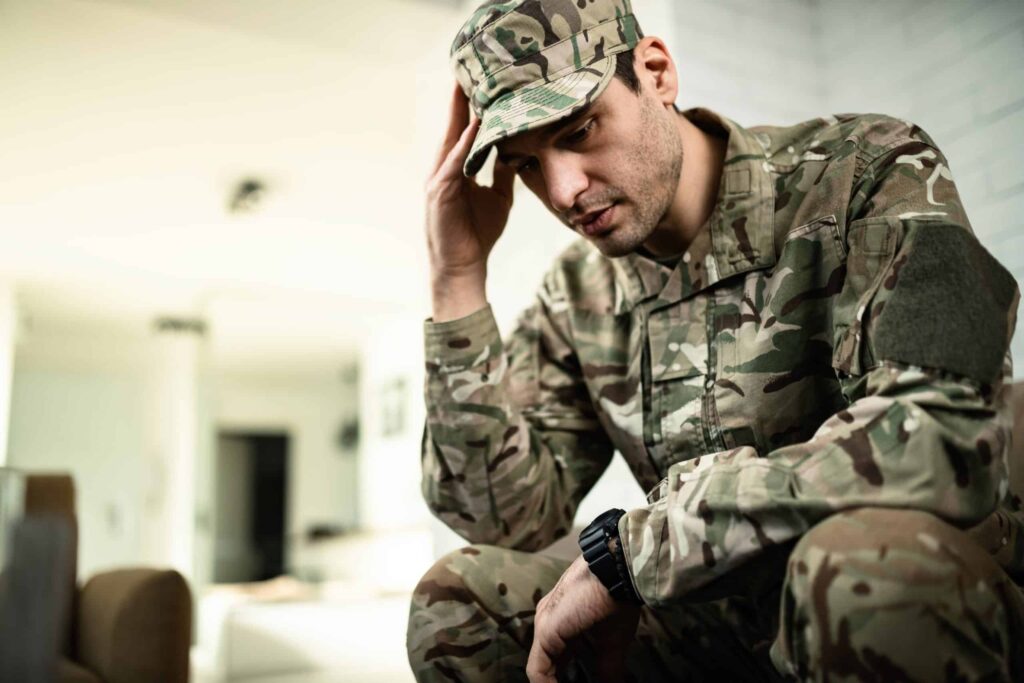Veterans can experience extreme guilt and shame in addiction recovery from experiences of trauma in combat, military conflicts, and deployment difficulties. Some Veterans experience a sense of survivor guilt after combat injuries or death within their teams. They may wonder why they remain unharmed when others died or had severe injuries. Civilian deaths and other situations can also induce feelings of guilt and shame in Veterans who witnessed these events.
Feelings of guilt can also be the result of depression, PTSD, and anxiety brought on through military traumas. Addicted Veterans can feel shame in becoming addicted to substances rather than being able to cope without drugs or alcohol. Guilt and shame in recovery can be a huge burden for Veterans to shoulder. Veterans recovering from substance abuse disorders and mental illness need to learn healthy ways to cope with intense feelings of guilt and shame.
How Guilt and Shame Can Affect Addiction Recovery
Veterans with guilt and shame in recovery are often overwhelmed with memories and “what if” scenarios that continually play through their thoughts. Veterans struggle to look for positive and healthy thoughts and hopes for a sober living situation when all they can feel is shame and guilt. They may obsess over what they could have done to change their traumatic situations. Feelings of not doing everything they could in a traumatic event, and watching innocent people get displaced or wounded and killed all build a wall of guilt and shame for Veterans. As a result, these feelings can interfere with their recovery if they don’t begin the work needed to overcome them.
The following behaviors can indicate that survivor’s guilt and shame burden a Veteran:
- Feeling unworthy
- Feeling confused or hesitant about wanting to live, suicidal ideations
- Avoidance behaviors
- Isolation
- Wanting to self-medicate with drugs or alcohol
These behaviors are difficult to leave behind and may slow progress while in recovery. However, learning new positive and healthy coping mechanisms is an important step in the process. Veterans feeling guilt and shame in addiction recovery can share with others who have similar feelings. This support will help in the healing process and make them feel less isolated and alone. A Veteran can deal with misplaced blame through individual counseling and group therapy sessions.
Steps on How to Let Go of Shame and Guilt in Addiction Recovery
Veterans looking for ways to let go of shame and guilt often find solace in sharing experiences with other Veterans with similar feelings. Crucial steps need to be taken while working through the extreme feelings of guilt and shame in recovery.
Veterans can examine events that haunt them by asking themselves to put the events in perspective and look at the following:
- Pinpointing who was responsible for the traumatic events that took place
- Transform guilt and shame into feelings of grief and mourning for something that you had no control over
- Learning to name the feelings of sadness and loss and take on the grieving process
- Consider the gratefulness your family and friends feel that you survived the traumas you experienced
- Do things for others that are positive and healthy, like volunteer or participate in group therapy
- Practice self-care and do things that make you feel happy
Veterans need to understand the importance of self-care while battling the guilt and shame while in recovery. The coping skills needed to sustain recovery can be learned while in rehab, counseling, and group therapy. In addition, sharing how you feel can be therapeutic in itself. Veterans need to be honest with themselves and others to maintain recovery and learn to overcome guilt and shame.
How to Help Someone Else Overcome Shame
Veterans sharing their feelings of guilt and shame in recovery can help someone else overcome shame by sharing their stories, feelings, and how they are changing their lives for the better. Being an example of hope can trigger feelings in others that they can make those same changes to overcome PTSD, depression, substance abuse, and extreme guilt and shame. Forming this ability to show others that change can take place builds confidence and a healthy sense of self. Changing how thoughts flow through your mind can also steer those traumatic memories into a new perspective that will stop guilt, blame, and shame. Invite others in recovery to share methods they are using to overcome guilt and shame in addiction recovery. It will help them build their self-esteem as well.
Recover at Our Veteran Rehab Programs
If you are a Veteran experiencing guilt and shame and need help to recover from unhealthy coping mechanisms, substance use disorders, PTSD, depression, and other difficulties contact Sunrise Veterans Health. We are here to help and have staff who understand the difficulties Veterans face like misplaced blame causing guilt and shame. Reaching out for help is the most important decision you can make. Visit our admissions page today for more.


